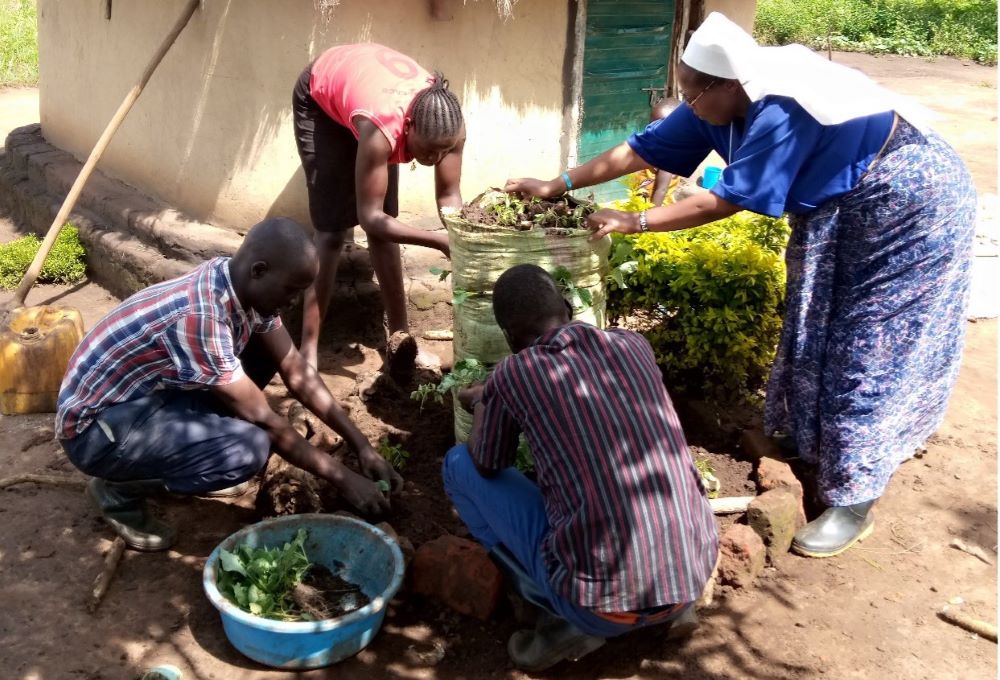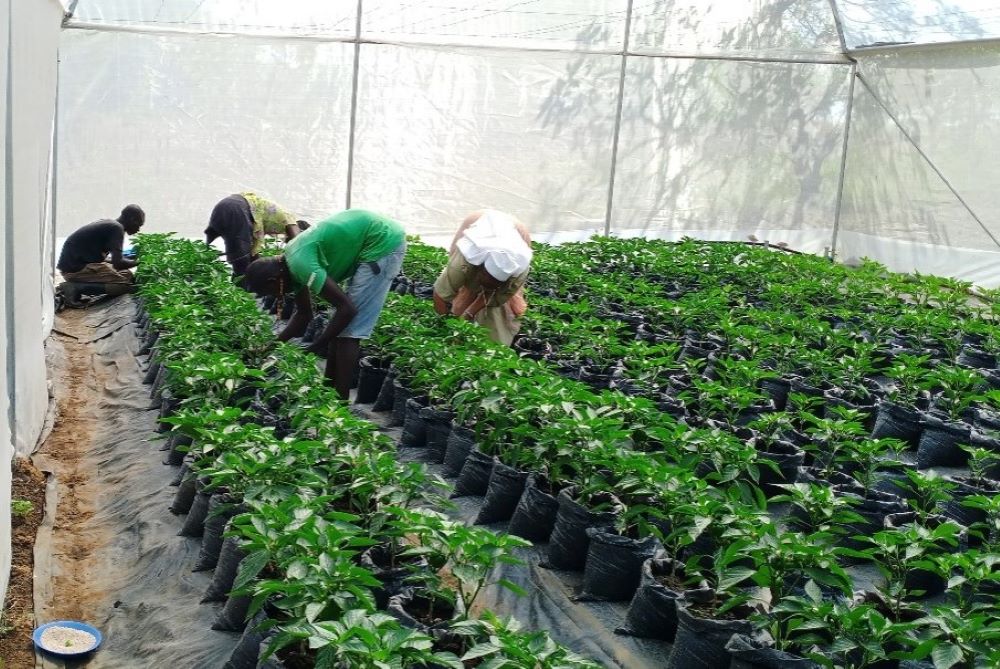
Sr. Zipporah Ngoiri Waitathu, right, demonstrates how to make a garden in a sack. Waitathu, who shares her knowledge of agroecology with youth and refugees in northern Uganda, said the skillls are a way to make a better life. (Courtesy of Zipporah Ngoiri Waitathu)
My great passion these days is agroecology. After my training in organic agriculture and business, I began collaborating with Sustainable Agriculture for Rural Development Network, Catholic Relief Services and the Don Bosco Vocational Center in the Palabek Refugee Settlement camp in northern Uganda. Before this, I also worked in school-based agricultural endeavors and am currently in charge of our congregation's farm in Namugongo.
I have found that youth add a key ingredient to the current movement from conventional agriculture practices to revamping agricultural productivity. I believe these new ways will be very transformative for the future. Through agriculture training, youth are learning skills for resource management, biodiversity conservation, waste reduction and renewable energy integration. These methods not only help restore the soil but help increase water retention and prevent erosion. Crop rotation and growing diverse crops together help replenish the soil, add variety to diets and can improve nutrition. Using natural fertilizers keeps the soil healthy and helps prevent disease. Adding animals, where possible, to these other practices is also important because they add tremendous value to the process of food production. Their waste, too, once it decomposes, is a key element for soil remediation.
I confess I have a soft spot for animals and especially enjoy working with bees, pigs and rabbits. Bees are great pollinators of all flowering plants and provide many products that benefit humanity: honey, wax, bee bread, propolis and royal jelly (a secretion used in the nutrition of larvae and adult queen bees). Rabbits, because they are small, need limited space and, with a gestation period of only 30 days, can deliver three to four times annually. They also provide tasty meat, and their wastes provide bio-fertilizers and pesticides. I enjoy pigs because they are friendly and even funny animals. They also multiply fast for selling at the market.
I find working with youth and refugees very rewarding because both groups are eager to engage in training and are willing to learn from their peers. Refugees hold a particular niche in farming practice because camps offer only limited space for what are called "kitchen gardens." At times, all that is available is an apartment balcony. Such spaces are especially challenging and involve a lot of creativity. Despite the challenges of providing food, these gardeners can also learn new methods that contribute to a greener, healthier earth, including the possibility of adding small animals. This addition can bring joy and even make a small space into a homestead, helping refugee families have a sense of home.

Participants in an agroecology workshop weed green pepper seedlings in a greenhouse. (Courtesy of Zipporah Ngoiri Waitathu)
Where I work, the Palabek Refugee Settlement, the majority of the families have escaped from the civil wars of South Sudan and the Democratic Republic of Congo. They experience deep vulnerability, often suffering a sense of hopelessness, being displaced from their homes and losing their former lives. Even so, they still have dreams for a better life, not just surviving but thriving. That is the goal of my work with them. To assist in these dreams.
One of the ways this happens is by commemorating World Refugee Day on June 20. This day was first celebrated in 2001, honoring the 50th anniversary of the 1951 Convention Relating to the Status of Refugees, formerly known as Africa Refugee Day. The United Nations General Assembly in 2000 changed the recognition to an international day. The purpose of the day is to shine a light on the rights, needs and dreams of refugee families and to help mobilize political will and resources to help them thrive, the U.N. website says. At the camp, we celebrate this important day by showcasing farming successes and exhibiting some of the foods families produce through their training programs. Participating in these events gives refugees a sense of pride and encourages their neighbors to take part in similar eco-agriculture training.
We also participate in an Indigenous and Traditional Foods and Seeds Fair organized by Participatory Ecological Land Use Management (PELUM). This is a platform creating awareness about the value of indigenous and traditional food systems. Farmers can showcase actual and potential contributions of farm-managed seed systems that conserve agricultural biodiversity, increase food security and honor the sovereignty of smallholder farming in Uganda and beyond. Even so, although more than 70% of people in Uganda practice farming, small-scale farmers are among the poorest people in the world, with more than 37.5% living below the poverty line of $1.25 per day.
Advertisement
At these events, everyone from Ugandan society enjoys seeing and hearing about indigenous and traditional foods and seeds: their preservation, preparation, innovation, value additions and consumption. Beyond this, the day provides farmers and others an opportunity to share and dialogue about their experiences regarding farm policy frameworks, benefits and threats to new ways of agriculture, and strategies they have learned to promote the various elements of agroecology.
I especially enjoy this day because I am able to present traditional food and seeds of the tribe I am from: the Acholi. We are from Northern Uganda, where we cultivate some special crops we are proud of: lady finger millet, pigweed, spider plant, indigenous maize and black turtle beans, as they are drought tolerant, fast maturing and resistant to pests and diseases.
My ministry in agroecology is enriching in so many ways. Learning many new things myself, seeing my trainees' crop yields increase, enjoying more nutritious food and producing enough to sell for added income are causes for rejoicing. Many families have been able to buy clothing, pay school fees and even send money to their loved ones. Success does not mean there are no challenges. Access to markets, insufficient water for irrigation, especially during the dry season, and at times, needing to sell an entire harvest because they are without other sources of income can mean painful decisions and even hunger. But one thing I know for sure is that farmers are resilient and pick themselves up and move forward. I am grateful to be part of their lives and to share their successes with others.








